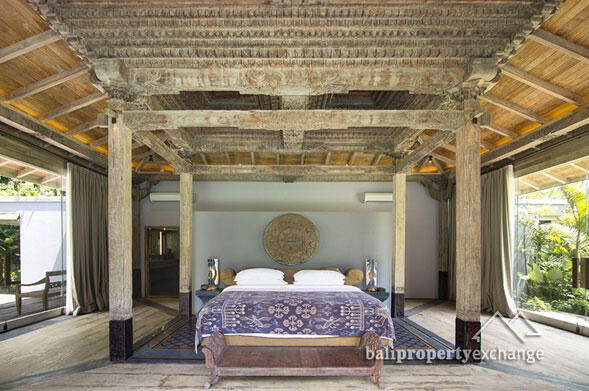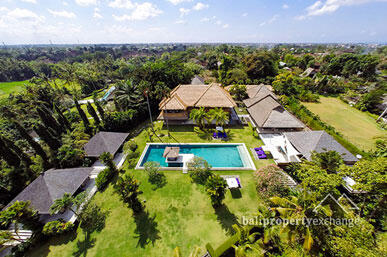TS
bpebali
5 THINGS TO KNOW BEFORE INVESTING IN THE BALI PROPERTY MARKET
#1 WHY?
Most importantly, why do you want to invest in Bali? Is it to reside here, or is it to acquire a dual-purpose property in which you can holiday from time to time and then also draw an income from while you are not using it?
This matters because while there is a massive amount of inventory for sale in Bali at the moment, and not all villages are zoned alike. Some are zoned for Tourism Accommodation and some for residential use only. While there are a brave many who are happy to roll the dice and try to set up their villa rental business in an area for which it is not zoned, a more prudent and secure investment strategy would be to acquire a villa in an area with the proper zoning.
#2 HOW
How can I legally acquire a Villa in Bali? There are many ways, and all of them are directly related to the country which has issued your passport . If you are an Indonesian citizen, then you have the legal right to acquire any type of property you choose, be it leasehold or freehold. If you are not an Indonesian citizen, then the choices are many, but there are a couple of restrictions to keep in mind.
First, let’s get some vocabulary straightened out because herein much of the confusion lies.
The Indonesian laws on property acquisition and ownership do not use the word “freehold”, but instead use the Indonesian term of “hak milik” which translates to “right to own”. Only Indonesian citizens can acquire a property under hak milik terms, as only they have the right to own. Foreigners have introduced the term “freehold” into discussions about real estate in Bali as a means to more easily understand the laws, but in fact, such a term has muddied the waters a bit and caused more than a little misunderstanding. Yes, foreigners can shop for property that is being marketed as “Freehold”, because as long as the property matches their criteria and passes due diligence, the foreigner can acquire that property directly without the use of the now-out-of-form Nominee Agreement. The foreigner can acquire the property under a title known as “Hak Pakai”, which translates to Right of Use. This is a term agreement (consecutive 80 year terms, and in perpetuity) with the Indonesian federal government which has caused a few to balk because “it looks like a lease”. On the surface it does look like a lease, but the 80 year term agreements can be a little misleading. When a foreigner has found a hak milik property that they would like to acquire, the purchase price of the villa is the same as if an Indonesian citizen was buying the hak milik from another Indonesian citizen. For the money in your pocket you can extend for as many 80 year terms as you want after the initial investment. But – and here’s the ‘but’ – a property held under Hak Pakai cannot legally acquire the necessary license to conduct a daily holiday villa rental business. And this is where many dreams run aground. A diligent investor may be able to find an option or two that has worked its way through the loophole and actually does allow for holiday rental under Hak Pakai, but these ‘grandfathered’ properties are rare and very difficult to find.
However, and luckily for the foreign investor, there are several very well structured leasehold properties which can provide all of the benefits that we look for when investing in Bali; flexible usage, capital appreciation and the right location. A leasehold agreement is completely legal and it requires no middleman or special certificates to acquire. Most leasehold villas for sale are offered in villages that allow for Tourism Accommodation and the process to acquire one is very straightforward. And to make it even easier for the foreign investor, any villa that is offered for sale via a leasehold transfer regardless of the village zoning, can also be used as a residence. Unless of course it is located within a villa estate that is operated as a hotel, then you may find some restrictions about annual usage.
#3 CAPITAL APPRECIATION ON A LEASEHOLD?
How does that work? And how do we exercise the “option to extend”?
In Bali, a leasehold acquisition requires that the total value of the property be paid up from and in full for the transfer to occur. Here’s an example: John and Mary acquired a plot of land under a leasehold structure and the lease term was for 25 years and the agreement came with an option to extend for 25 more years. They spent a year or so building a villa and then enjoyed the villa for 4 more years before life circumstances required that they sell the villa. Enter Tom and Kim. Tom and Kim can buy the lease contract from John and Mary and assume all of the terms and conditions that John and Mary agreed to when they acquired the land 5 years ago. Simple and straight forward. Depending on a range of factors that impact all real estate markets, John and Mary can actually price the value of their lease for an amount greater than they invested – including the funds invested to build the villa – and voila, capital appreciation is realized on a lease agreement. The longer the initial term, the greater likelihood that one will realize capital appreciation. And while the norm has been a 25 year lease plus a 25 year option to extend, many leases are structured with an initial term of 30 or 35 years. This market is very flexible and encourages progressive and out of the box thinking.
The option to extend your lease is based on the value of your land only, not the improvements. How and when that value is calculated is written into the original lease and all subsequent lessees of the property have agreed to respect those terms. However, given the flexibility of the Bali market, oftentimes both the lessor and the lessee would like to agree to modify their agreement and execute the extension ahead of schedule. Perhaps the landowner needs a few bucks for school fees, ceremonies or the like, or maybe the foreigner would like to increase his tenure to make the villa more attractive if resale is the objective. Again, the market is flexible, so find an agent you can trust and ask the straightforward questions.
#4 WHAT ?
What are my closing costs? As a buyer of a leasehold property, you pay no tax or stamp duty upon settlement and the agent’s fees are paid by the seller. The only fee that you would pay in addition to the purchase price is a fee of 1% of that purchase price to the public notary of your choosing to complete the due diligence on the property and draft the agreements.
As a buyer of a Hak Milik/Hak Pakai property, you are required to pay a 5% transfer or acquisition fee and the 1% fee to the notary.
As a seller of a leasehold property you are required to pay the agent’s fees and a 10% tax on the value of the property as recorded in the transfer deed.
As a seller of a Hak Milik/Hak Pakai property, you are required to pay the agent’s fees and 2.5% of the value of the property.
#5 WHAT ABOUT……?
“We’ve heard so many stories about people getting ripped off. How do we prevent that from happening to us?”
Get it in writing. A good rule of thumb to follow. If an agent – or in some cases, a legal representative – tells you that a certain practice is ‘customary’, as opposed to ‘legal’, ask them to put it in writing.
Go with an established agent/agency. Agencies open and close in Bali more quickly than in other locations. If an agent has been in the industry for a while they will have references and scores of past buyers who would be happy to share their experiences with you. But take note, the laws surrounding property ownership in Bali are complicated and not every home owner fully understands the details of their own arrangement, let alone yours. Your peace of mind really boils down to sitting across the table from an agent and knowing in your heart of hearts that you can do business with this particular individual. Most good agents will encourage you to find good sound legal advice from someone who is licensed to give it.
I hope that this short article has helped shed some light onto a few of the general misconceptions about property acquisition in Bali. For more clarification or to view some fine offerings on the market, please visit www.balipropertyexchange.com or email me on pclancy@balipropertyexchange.com.
Thanks for reading this blog. If you found it helpful, please share it with a friend or two who may be interested in what’s happening in the Bali real estate market.
Bali Property Exchange, Bali Property, Bali Real Estate, Villas In Bali, Villas Seminyak, Villas Canggu, Bali Sale, Bali Villa For Sale, Bali Land For Sale, Bali Villa, Bali Land, Property In Bali, Buy Villa In Bali, Buy Land In Bali



Most importantly, why do you want to invest in Bali? Is it to reside here, or is it to acquire a dual-purpose property in which you can holiday from time to time and then also draw an income from while you are not using it?
This matters because while there is a massive amount of inventory for sale in Bali at the moment, and not all villages are zoned alike. Some are zoned for Tourism Accommodation and some for residential use only. While there are a brave many who are happy to roll the dice and try to set up their villa rental business in an area for which it is not zoned, a more prudent and secure investment strategy would be to acquire a villa in an area with the proper zoning.
#2 HOW
How can I legally acquire a Villa in Bali? There are many ways, and all of them are directly related to the country which has issued your passport . If you are an Indonesian citizen, then you have the legal right to acquire any type of property you choose, be it leasehold or freehold. If you are not an Indonesian citizen, then the choices are many, but there are a couple of restrictions to keep in mind.
First, let’s get some vocabulary straightened out because herein much of the confusion lies.
The Indonesian laws on property acquisition and ownership do not use the word “freehold”, but instead use the Indonesian term of “hak milik” which translates to “right to own”. Only Indonesian citizens can acquire a property under hak milik terms, as only they have the right to own. Foreigners have introduced the term “freehold” into discussions about real estate in Bali as a means to more easily understand the laws, but in fact, such a term has muddied the waters a bit and caused more than a little misunderstanding. Yes, foreigners can shop for property that is being marketed as “Freehold”, because as long as the property matches their criteria and passes due diligence, the foreigner can acquire that property directly without the use of the now-out-of-form Nominee Agreement. The foreigner can acquire the property under a title known as “Hak Pakai”, which translates to Right of Use. This is a term agreement (consecutive 80 year terms, and in perpetuity) with the Indonesian federal government which has caused a few to balk because “it looks like a lease”. On the surface it does look like a lease, but the 80 year term agreements can be a little misleading. When a foreigner has found a hak milik property that they would like to acquire, the purchase price of the villa is the same as if an Indonesian citizen was buying the hak milik from another Indonesian citizen. For the money in your pocket you can extend for as many 80 year terms as you want after the initial investment. But – and here’s the ‘but’ – a property held under Hak Pakai cannot legally acquire the necessary license to conduct a daily holiday villa rental business. And this is where many dreams run aground. A diligent investor may be able to find an option or two that has worked its way through the loophole and actually does allow for holiday rental under Hak Pakai, but these ‘grandfathered’ properties are rare and very difficult to find.
However, and luckily for the foreign investor, there are several very well structured leasehold properties which can provide all of the benefits that we look for when investing in Bali; flexible usage, capital appreciation and the right location. A leasehold agreement is completely legal and it requires no middleman or special certificates to acquire. Most leasehold villas for sale are offered in villages that allow for Tourism Accommodation and the process to acquire one is very straightforward. And to make it even easier for the foreign investor, any villa that is offered for sale via a leasehold transfer regardless of the village zoning, can also be used as a residence. Unless of course it is located within a villa estate that is operated as a hotel, then you may find some restrictions about annual usage.
#3 CAPITAL APPRECIATION ON A LEASEHOLD?
How does that work? And how do we exercise the “option to extend”?
In Bali, a leasehold acquisition requires that the total value of the property be paid up from and in full for the transfer to occur. Here’s an example: John and Mary acquired a plot of land under a leasehold structure and the lease term was for 25 years and the agreement came with an option to extend for 25 more years. They spent a year or so building a villa and then enjoyed the villa for 4 more years before life circumstances required that they sell the villa. Enter Tom and Kim. Tom and Kim can buy the lease contract from John and Mary and assume all of the terms and conditions that John and Mary agreed to when they acquired the land 5 years ago. Simple and straight forward. Depending on a range of factors that impact all real estate markets, John and Mary can actually price the value of their lease for an amount greater than they invested – including the funds invested to build the villa – and voila, capital appreciation is realized on a lease agreement. The longer the initial term, the greater likelihood that one will realize capital appreciation. And while the norm has been a 25 year lease plus a 25 year option to extend, many leases are structured with an initial term of 30 or 35 years. This market is very flexible and encourages progressive and out of the box thinking.
The option to extend your lease is based on the value of your land only, not the improvements. How and when that value is calculated is written into the original lease and all subsequent lessees of the property have agreed to respect those terms. However, given the flexibility of the Bali market, oftentimes both the lessor and the lessee would like to agree to modify their agreement and execute the extension ahead of schedule. Perhaps the landowner needs a few bucks for school fees, ceremonies or the like, or maybe the foreigner would like to increase his tenure to make the villa more attractive if resale is the objective. Again, the market is flexible, so find an agent you can trust and ask the straightforward questions.
#4 WHAT ?
What are my closing costs? As a buyer of a leasehold property, you pay no tax or stamp duty upon settlement and the agent’s fees are paid by the seller. The only fee that you would pay in addition to the purchase price is a fee of 1% of that purchase price to the public notary of your choosing to complete the due diligence on the property and draft the agreements.
As a buyer of a Hak Milik/Hak Pakai property, you are required to pay a 5% transfer or acquisition fee and the 1% fee to the notary.
As a seller of a leasehold property you are required to pay the agent’s fees and a 10% tax on the value of the property as recorded in the transfer deed.
As a seller of a Hak Milik/Hak Pakai property, you are required to pay the agent’s fees and 2.5% of the value of the property.
#5 WHAT ABOUT……?
“We’ve heard so many stories about people getting ripped off. How do we prevent that from happening to us?”
Get it in writing. A good rule of thumb to follow. If an agent – or in some cases, a legal representative – tells you that a certain practice is ‘customary’, as opposed to ‘legal’, ask them to put it in writing.
Go with an established agent/agency. Agencies open and close in Bali more quickly than in other locations. If an agent has been in the industry for a while they will have references and scores of past buyers who would be happy to share their experiences with you. But take note, the laws surrounding property ownership in Bali are complicated and not every home owner fully understands the details of their own arrangement, let alone yours. Your peace of mind really boils down to sitting across the table from an agent and knowing in your heart of hearts that you can do business with this particular individual. Most good agents will encourage you to find good sound legal advice from someone who is licensed to give it.
I hope that this short article has helped shed some light onto a few of the general misconceptions about property acquisition in Bali. For more clarification or to view some fine offerings on the market, please visit www.balipropertyexchange.com or email me on pclancy@balipropertyexchange.com.
Thanks for reading this blog. If you found it helpful, please share it with a friend or two who may be interested in what’s happening in the Bali real estate market.
Bali Property Exchange, Bali Property, Bali Real Estate, Villas In Bali, Villas Seminyak, Villas Canggu, Bali Sale, Bali Villa For Sale, Bali Land For Sale, Bali Villa, Bali Land, Property In Bali, Buy Villa In Bali, Buy Land In Bali




0
2.7K
2
Komentar yang asik ya
Urutan
Terbaru
Terlama
Komentar yang asik ya
Komunitas Pilihan